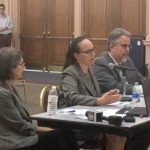Hundreds of times Dr. Raquel Forsythe has had to tell families their loved one has died from a bullet-wound trauma that surgeons just couldn’t repair.
The UPMC director of trauma takes a moment to steel herself first, even though she’s done it before and she’ll do it again. She checks to see if she needs to change her scrubs – checks to see if there’s blood on them.
Forsythe detailed the grim routine during a policy hearing convened by House Democrats on Friday at the University of Pittsburgh. The topic was gun violence as a public health epidemic.
“Families notice you have the blood of their loved one on your clothes,” she said.
She silences her pager and her cellphone. She asks the social worker to make sure only the closest family members are there. Walking in, the anxiety, wondering and praying are palpable, she said.
“I know I am about to take that hope away,” she said, illustrating in stark reality the topic of the day: gun violence.
She tells them the news is not good, trying to give them that brief beat to prepare.
“And then,” she said, “I have to tell them that their loved one has died.”
Called by Rep. Dan Frankel, D-Squirrel Hill, the panels included data analysts, medical professionals and community leaders, and the discussion revolved around viewing gun violence through the lens of a public health epidemic.
And it is a public health crisis, said Dr. Deborah Moss, a pediatrician, president of the state chapter of the American Academy of Pediatrics, a speaker on the panel of medical professionals.
“If it’s not a health issue, why are people dying from it?” she said. She alluded to a tweet last year from the National Rifle Association suggesting that “self-important anti-gun doctors” should “stay in their lane.”
Frankel said the conversations about gun control have been too narrow.
“Unfortunately, too much of the discussion about gun violence has been about restricting or protecting gun ownership, and not enough discussion has focused on the actual health impact of easy access to these weapons,” he said.
Heath Johnson, crime analysis coordinator for the Pittsburgh police, detailed the innovative approaches that officers are taking to combat the spread of violence, including the Group Violence Intervention Unit. Formed in 2015, the unit relies on dedicated detectives and civilian outreach to get to young people who are – or could be – involved in group and gang violence.
The idea, he said, is to get those individuals out of that situation. The unit meets biweekly to analyze shootings and see where there is potential for retaliation.
It’s not just about street violence and mass shootings, according to Frankel.
“Suicide (attempts) through the use of firearms is an epidemic in this country, and it’s irreversible in most cases,” he said, noting that suicide is not just an issue for urban areas.
Frankel said that now is the time to implement universal background checks in the state.
“There’s no reason that in Pennsylvania you need a background check for a handgun but not for a long gun – and long guns include semi-automatic weapons that are being used in these mass shootings,” he said.
Nicole Molinaro, president of the Women’s Center and Shelter of Greater Pittsburgh, applauded some of the legislation that has already passed, including Act 79.
Previously, individuals served with a protection-from-abuse order had 60 days to turn over their firearms, and even then a friend or family member qualified as someone to take possession of the weapons. Act 79 closed that time period from 60 days to 24 hours.
Molinaro said it’s still not enough.
“We believe that requiring defendants to hand over firearms to law enforcement immediately when they are served with a protection-from-abuse order would improve safety outcomes for survivors in Allegheny County,” she said.
Frankel convened the day’s session to address “the overwhelming damage left in the wake of every incidence of gun violence,” he said. In the end, it “helped us understand what bullets can do to the human body, the family unit, the neighborhood and the state.”











